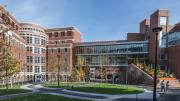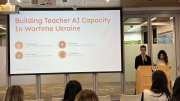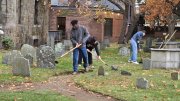Attorneys Laverne Berry and Steve Miller have volunteered in each of the last three presidential elections. In 2008, 2012, and 2016 they joined a national effort—led by organizations like Election Protection, Rock the Vote, the League of Women Voters, and the NAACP— to achieve a simple task: allow citizens to exercise their right to cast a ballot. The difficulties of protecting that simple action are detailed in Capturing the Flag. Filmed in Fayetteville, North Carolina, the documentary captures the subtle and often mundane ways in which states like North Carolina are discriminating against their residents through the implementation of new voter ID laws.
At the Institute of Politics (IOP) last week, Berry and Miller participated in a screening of their film and a panel discussion of voter suppression. Moderated by IOP fellow Brittany Packnett, co-founder of the anti-police-brutality Campaign Zero, the discussion brought Berry and Miller into conversation with the Reverend William Barber II, leader of Repairing the Breach and co-chair of the Poor People’s Campaign, along with Alex Keyssar, Stirling professor of history and social policy at the Kennedy School.
“You’d think it was something big to notice,” Berry said. “But actually, it’s a number of very, very little cuts.” Since 2010, those little cuts have taken place in 23 states. They include limitations to early voting procedures; complicated pre-registration procedures; and the enactment of strict voter ID laws whose enforcement disproportionately impacts black, Latino, and low-income voters, who may not possess the state-sanctioned ID (commonly, a driver’s license) required to vote. The loss of those millions of votes in the 2016 election is, according to Barber, the “least discussed and most important topic of our time.”
Barber—for whom the announcement of last week’s MacArthur “genius grant” coincided with an act of civil disobedience in front of a Chicago McDonald's—was first to speak at Thursday’s event. The moral imperative of the moment, he said, was to recognize the historical precedent of what he called “the gangsterization” of politics. “In order to understand this moment,” he declared, “you have to know some numbers”: 1877, when Rutherford B. Hayes became the first president elected without a majority of the popular vote; 1883, when Hayes’s Supreme Court pulled federal troops out of the process of Reconstruction; 1896, Plessy v. Ferguson, and what Barber calls “a season of white supremacy.” If those numbers seem hard to recall, he encouraged the audience to remember just one: 2013, Shelby v. Holder, the Supreme Court case that gutted Article V of the Voting Rights Act, allowing for discriminatory policies such as closing polling places in predominately African-American counties, and voter ID laws.
“You might think,” Berry said, “there’s no problem in everyone having an ID.” But as the documentary explained, these laws primarily impact minority and lower-income citizens who might not have the means to acquire a new ID in time to vote. Berry had worked “in a neighborhood that was mostly elderly and poor folks that had two kinds of ballots: provisional and regular. The poll workers, when they gave people provisional ballots, they didn’t say that for the ballot to count, you had to sign an affidavit.” Many voters would check the boxes, slip their provisional ballots in the box, and walk away without realizing they’d never cast their vote. “There were no signs, no information, to tell them so.” Meanwhile, Miller added, “In Texas, you can vote with a gun permit but not with a student ID.” Knowing this, many people don’t even come out to vote in the first place.
“So,” said the first audience member to speak after the panel, “What do we do to fix it?” The speaker was a student at the Kennedy School and Berry, who opened the conversation by referring to the many “little cuts” made against democracy, straightened up. “So much of the time, we don’t do things because we think we can’t make a big difference. But it’s not about making the big difference. It’s about making the small ones.” For example—the elected official in North Carolina who won his election with four votes. “Just driving one person to the polls,” Berry said, “can be a difference.”
It was a surprisingly uncomplicated answer. Berry’s invocation of the “small action” seemed at odds with the act of leaving New York City for the precincts of North Carolina, as the lawyers had done; but perhaps that was the point: that too often, the inability to fix everything discourages the contemplation of any act at all. Capturing the Flag suggests that another task for voters is to consider why we perceive such community-affirming acts to be insignificant in the first place, or whether a thousand little counter-cuts might be possible, especially if they are made in conjunction with demands on our politicians, institutions, and one another.
As audience members slipped back out into the New England drizzle, more than one person was heard saying that these were things that could be done—not tomorrow, but today.
More information about Capturing the Flag, and screening dates, are available at their website.









